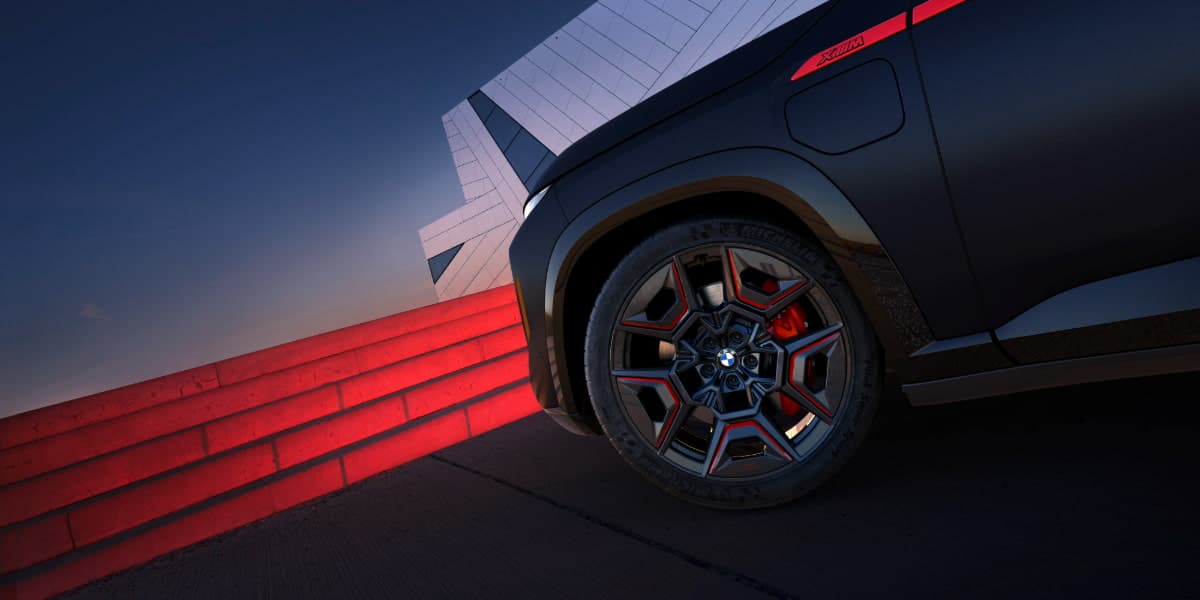If you drive a BMW, you know it’s not just about having a luxury car—it’s about having a driving experience that’s smooth, responsive, and thrilling. Whether you’re taking a sharp curve, heading out on a long road trip, or just running errands around town, one thing always needs to work perfectly: your BMW brakes.
Great braking isn’t just about stopping quickly. It’s about feeling in control, especially when you’re pushing your car a little harder—maybe on a mountain road or even at a track day. That’s where BMW’s high-performance brake options come in.
But here’s the thing: not all brake systems are the same. If you’ve been researching upgrades or shopping for an M model, you’ve probably come across two main choices: M Compound brakes and BMW carbon ceramic brakes. Both are built for serious performance, but they’re designed for different kinds of driving.
So how do you know which one is right for you?
In this blog, we’ll break it all down in simple terms. We’ll explain:
- What makes BMW brakes different from standard brake systems
- The pros and cons of M Compound vs. BMW carbon ceramic brakes
- How tire choice affects your stopping power
- And what kind of driver benefits most from each option
Whether you’re a weekend warrior looking for better track performance or a daily driver who just wants safer, stronger brakes, this guide will help you make a smart choice. Plus, we’ll answer common questions like:
- Are BMW carbon ceramic brakes worth the upgrade?
- Do these brakes make noise?
- What tires should I pair with performance brakes?
- How long do they last?
Let’s take a closer look at how BMW engineers some of the best braking systems in the world—and how you can get the most out of yours.
What Makes BMW Brakes So Special?
When people think of BMW, they usually picture sleek design, powerful engines, and that unmistakable “driver’s car” feel. But one of the most important parts of that experience—something that often goes unnoticed—is how the car slows down just as confidently as it speeds up. That’s where BMW brakes come in.
BMW doesn’t just build engines that go fast. They also design brake systems that help you stay in control at every speed. Whether you’re pulling out of your driveway or braking from 120 mph on the highway, the brake system needs to be strong, smooth, and consistent. It’s all about giving you the confidence to drive the way your BMW was meant to be driven.
What sets BMW’s high-performance brakes apart is how well they match the power of the car. Standard brakes work just fine for regular driving. But if you own or are shopping for a BMW M model—or if you simply want to upgrade your stopping power—you’ll probably run into two key options: M Compound brakes and BMW carbon ceramic brakes. These were developed by BMW’s high-performance M division and are engineered to handle much more than your average brake system. To learn more about BMW’s M division and their performance philosophy, you’ll find that every component is designed for serious driving enthusiasts.
So what’s the difference between the two? And which one fits your driving style?
Let’s start by looking at M Compound brakes, which come standard on many BMW M cars.
M Compound Brakes: Powerful and Practical for Daily Driving
If your BMW came from the factory with M Compound brakes, you’re already driving with a system that’s a big step up from standard braking setups. These brakes are made using a mix of cast iron and aluminum, which makes them lighter than traditional brake rotors—but just as strong.
Why does that matter? Lighter brakes reduce what’s called unsprung weight—basically, the weight that’s not supported by your car’s suspension. Less unsprung weight helps your car respond faster to turns, bumps, and other road changes. In short, M Compound brakes make your car feel sharper and more agile.
Why BMW Drivers Love M Compound Brakes:
- Better Handling: The lighter design improves how your car turns and reacts.
- Less Brake Fade: They handle heat better, which means more consistent stopping—especially if you’re braking hard or often.
- Everyday Comfort: Even with their sporty design, they’re still quiet, smooth, and easy to use in daily traffic.
M Compound brakes are designed to handle a lot. You can trust them during a spirited drive through the mountains or on an occasional track day. But they’re also easy to live with when you’re just running errands or driving to work.
Are M Compound Brakes Right for You?
If you enjoy sporty driving but don’t plan to race your car or take it to the track every weekend, M Compound brakes are probably your best fit. They strike the perfect balance between high performance and everyday comfort. And since they come standard on many M models, you won’t have to pay extra for the upgrade.
But if you’re looking for the ultimate in performance—especially if you’re planning to drive at high speeds often or push your car to the edge—you may want to consider what’s next: BMW carbon ceramic brakes.
BMW Carbon Ceramic Brakes: Ultimate Performance for Serious Drivers
If you’re the kind of driver who really loves performance—someone who enjoys high speeds, sharp turns, and maybe even the occasional track day—then it’s worth taking a serious look at BMW carbon ceramic brakes. These brakes are one of the most advanced options available in any production car, and they’re built to handle extreme conditions.
Available as an upgrade on many M models (like the M3, M4, M5, and M8), BMW carbon ceramic brakes are made from a special mix of carbon fiber and ceramic materials. This gives them some major advantages over regular or even M Compound brakes.
What Makes BMW Carbon Ceramic Brakes Special?
Unlike traditional brake rotors, which are usually made of cast iron or a compound blend, BMW carbon ceramic brakes are much lighter. That means less weight for your car to carry, which improves not only braking but also acceleration, cornering, and even fuel efficiency in some cases.
They’re also incredibly strong and heat-resistant. Regular brakes can get hot when you use them a lot—like during mountain driving or track laps—and that heat can cause “brake fade,” which makes your brakes feel soft and less effective. BMW carbon ceramic brakes don’t have that problem. They can take repeated hard braking without losing stopping power.
Perks of BMW Carbon Ceramic Brakes:
- Super lightweight: This improves both your car’s handling and stopping power.
- Extreme heat resistance: They stay cool and strong even under serious stress.
- Long lifespan: Many drivers report 100,000 miles or more with proper use.
- Gold calipers: These aren’t just for looks—they also signal top-tier performance.
Are There Any Downsides?
Like any high-performance part, BMW carbon ceramic brakes come with a few trade-offs.
- They work best when hot: These brakes are designed to perform at high temperatures. So if you mostly drive around town or in stop-and-go traffic, they may feel a little stiff or noisy until they warm up.
- They’re a big investment: BMW carbon ceramic brakes can add several thousand dollars to the cost of your BMW. If you’re not driving hard enough to fully use them, you might not get the full value.
- Repairs and replacements are expensive: While they last a long time, when they eventually do wear out, they can be costly to replace.
Who Should Get BMW Carbon Ceramic Brakes?
BMW carbon ceramic brakes are best for drivers who:
- Spend a lot of time on the track
- Drive aggressively on mountain roads or high-speed highways
- Want the absolute best in stopping performance and control
- Plan to keep the car for a long time and want brakes that last
If that sounds like you, the upgrade could be more than worth it. But if you’re mostly using your BMW for commuting, school runs, or casual cruising, M Compound brakes will likely meet all your needs—without the extra cost.
Which BMW Brakes Should You Pick?
Trying to decide between M Compound brakes and BMW carbon ceramic brakes? You’re not alone—it’s a common question among BMW drivers, especially those buying or upgrading an M model. The truth is, both systems are great, but they’re designed for different types of driving.
Let’s break it down so you can make the right call based on how you use your BMW.
Side-by-Side Comparison
| Feature | M Compound Brakes | BMW Carbon Ceramic Brakes |
|---|---|---|
| Weight | Lighter than standard brakes | Much lighter—reduces unsprung weight |
| Heat Resistance | Great for spirited driving | Excellent for extreme, repeated braking |
| Best For | Daily driving + weekend fun | High-speed, track, or mountain road driving |
| Price | Often included with M models | Premium upgrade (can cost several thousand) |
| Durability | Around 50,000–70,000 miles (average) | Can last over 100,000 miles with proper use |
| Look | Blue or red calipers | Gold calipers for a high-performance finish |
So, Which Brakes Are Right for You?
If you mostly use your BMW for daily driving, highway trips, and the occasional spirited run through the hills, M Compound brakes are more than enough. They’re strong, responsive, and designed to give you great stopping power without being too aggressive. They’re also easier on your wallet and don’t require special care.
But if you’re someone who:
- Hits the racetrack regularly
- Pushes your car hard on winding roads
- Wants the absolute best braking performance
- Or simply wants the bragging rights and long-term durability
…then BMW carbon ceramic brakes could be worth the extra investment. They’re designed for serious performance, with less weight, less fade, and longer life—especially under high-heat conditions. The M340i delivers exactly this kind of thrilling performance with its advanced braking system and precise handling characteristics
Not Sure Which One You Have?
If you’re not sure which brakes your BMW already has, you can usually tell by looking at the calipers:
- M Compound brakes typically come in blue or red
- BMW carbon ceramic brakes come in gold, and the rotors often have a dull, textured finish (not shiny steel)
Of course, your dealership or service provider can also confirm which system is installed—and help you decide if an upgrade is right for your needs.
Don’t Forget the Tires
You could have the best BMW brakes in the world—M Compound or BMW carbon ceramic brakes—but they won’t work the way they’re supposed to unless your tires can keep up.
Why? Because your tires are the only part of your car that actually touches the road. That’s right—when you slam on the brakes, it’s your tires that create the friction needed to slow the car down. If your tires don’t have enough grip, your stopping power suffers—no matter how advanced your brake system is.
Why Tires Matter When It Comes to Braking
Tires aren’t just about traction during acceleration or cornering. They play a huge role in how quickly and safely your BMW can stop. Here’s why the right tires make all the difference:
- Better grip = shorter stopping distance
Tires with softer rubber and optimized tread patterns can grip the road more effectively, helping your brakes bring the car to a stop faster and more smoothly. - Wider tires = more contact with the road
A wider tire gives you a larger contact patch, which means better traction, especially in dry conditions. - Summer performance tires = ideal for dry braking
These tires are designed to deliver maximum grip in warm weather, making them perfect for drivers who want sharper handling and better stopping distances. - All-season tires = good for convenience, not max performance
If you use your BMW as a daily driver and live in a place with changing weather, all-season tires offer flexibility. But they don’t provide the same level of performance as dedicated summer tires—especially under hard braking or high speeds.
Popular Tires for BMW M and Performance Models
If you’re upgrading your BMW brakes, consider pairing them with high-performance tires made to handle the extra stopping force. Here are a few options trusted by enthusiasts and even used as original equipment on M cars:
- Michelin Pilot Sport 4S
Widely considered one of the best all-around performance tires, offering excellent dry and wet grip, long tread life, and precise steering. - Pirelli P Zero
Commonly found on high-end sports cars, including BMW M models. Delivers great grip and sharp response, especially in warm weather. - Continental ExtremeContact Sport
A solid alternative that offers strong performance at a slightly lower price point. Great for spirited daily driving and light track use.
Pro Tip: Match Tires to Driving Style and Brake Setup
If you’re upgrading to BMW carbon ceramic brakes, you’ll want tires that can truly match the system’s high performance. Using basic or worn-out tires with top-tier brakes won’t give you the results you’re looking for—and may even feel underwhelming.
On the other hand, if you’re running M Compound brakes and mostly drive on city streets or highways, a good set of summer or ultra-high-performance all-season tires may be all you need.
Bonus Tip: Check Your Tire Pressure Regularly
Even the best tires can’t do their job if they’re underinflated. Keep an eye on your tire pressure, especially during temperature changes, to maintain proper grip and safety.
Your BMW brakes and your tires work together as a system. Upgrading one without considering the other can limit the performance benefits you’re trying to achieve. So if you’re investing in better stopping power, don’t forget to give your tires just as much attention.
Taking Care of Your BMW Brakes
No matter which brake system you choose—M Compound brakes or BMW carbon ceramic brakes—routine care is key to keeping them working their best. Performance parts can only deliver top results if they’re properly maintained. And the good news? Taking care of your BMW brakes doesn’t have to be complicated.
Here are some simple but important tips to keep your brakes in top condition:
Get Regular Brake Inspections
Each time you bring your car in for an oil change or service, ask your technician to check your brakes. For comprehensive guidance on keeping your BMW in peak condition, check out our essential BMW maintenance tips and strategies that can help you save money while protecting your investment:
Use the Right Brake Fluid
BMW performance brake systems typically require DOT 4 or higher brake fluid. This type resists high heat and won’t break down as quickly—important for hard braking or track use. Your owner’s manual or dealership can confirm the best fluid for your model.
Clean Your Wheels Often
Brake dust can build up on your wheels—and it’s more than just a cosmetic issue. Over time, brake dust can corrode wheel finishes or interfere with brake performance. A quick wash every couple of weeks goes a long way, especially if you have large performance rotors.
Pay Attention to Sounds
If you hear squealing, grinding, or feel vibrations when braking, don’t ignore it. These sounds can signal worn-out pads, debris caught in the caliper, or even rotor damage. Catching problems early helps you avoid bigger (and more expensive) repairs.
Special Tip for BMW Carbon Ceramic Brakes
If you’re using BMW carbon ceramic brakes, remember that they perform best when they’re warm. When cold—like on short trips or in colder climates—they may make more noise or feel a bit firm at first. That’s totally normal. Once they’re up to temperature, they offer unmatched stopping power and control.
Final Thoughts on BMW Brakes
When it comes to performance, safety, and driving confidence, few things matter more than your BMW brakes. They don’t just stop the car—they give you control, stability, and a feeling of connection to the road.
Whether you stick with M Compound brakes for their balance and everyday comfort, or upgrade to BMW carbon ceramic brakes for the ultimate in stopping power, you’re choosing from two of the best systems on the market. And when paired with the right set of performance tires, your BMW will drive, stop, and handle exactly the way it was meant to.
Regular maintenance, smart upgrades, and a little bit of brake knowledge go a long way in protecting your investment—and making every drive feel like a true BMW experience. The right BMW brakes can transform how your car performs, whether you’re navigating city streets or pushing the limits on a mountain road.
Thinking About Upgrading Your BMW Brakes?
Not sure which setup is right for your car? We’re here to help. Whether you’re looking to improve your daily drive or get track-ready performance, we’ll help you choose the best combination of BMW brakes, tires, and service options to match your goals.
Click here to learn more or contact us today for expert advice and high-performance solutions tailored to your BMW.






